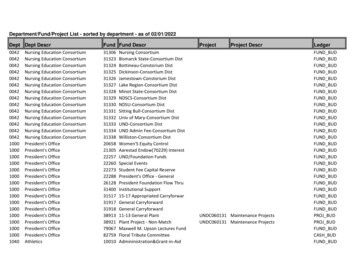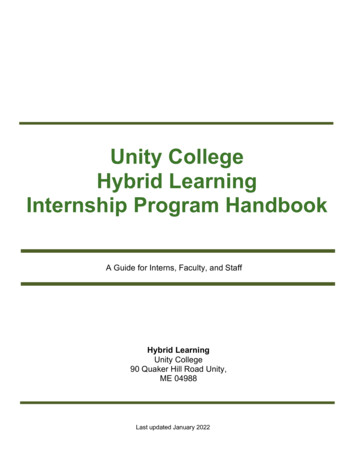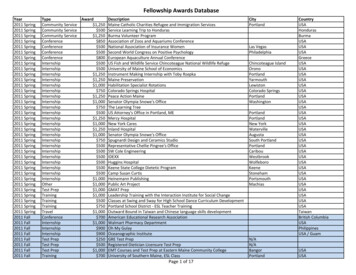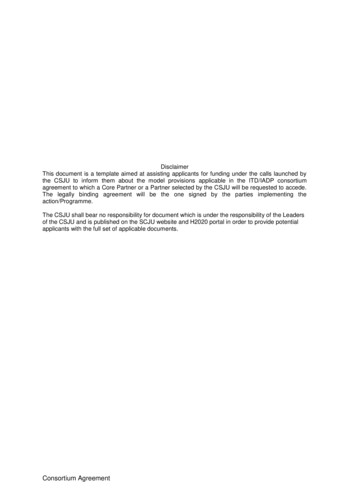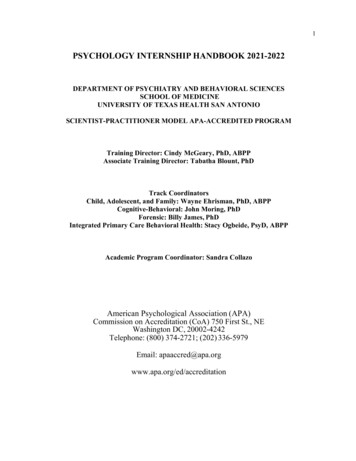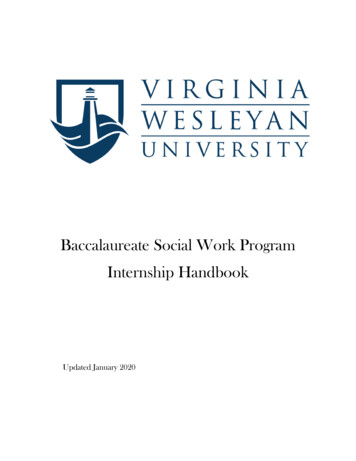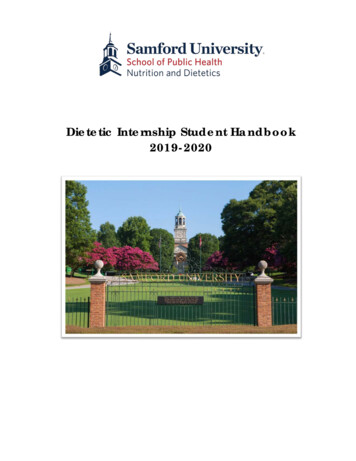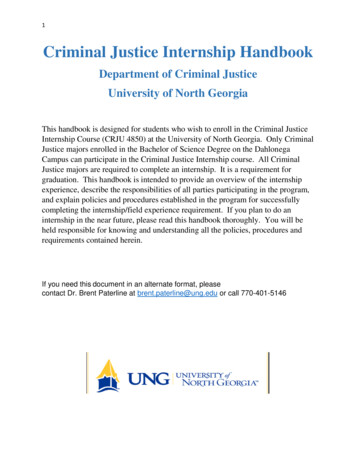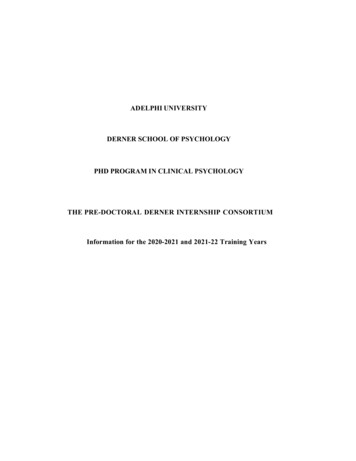
Transcription
ADELPHI UNIVERSITYDERNER SCHOOL OF PSYCHOLOGYPHD PROGRAM IN CLINICAL PSYCHOLOGYTHE PRE-DOCTORAL DERNER INTERNSHIP CONSORTIUMInformation for the 2020-2021 and 2021-22 Training Years
Introduction:This Handbook describes the training program for the Derner Internship Consortium. Questionsabout the program are encouraged. This information is current and accurate at the time it waswritten but may be subject to revision.Listing information:Internship Title:Training Term and Level:Internship Training Director:Address:Telephone:E-mail:Derner Internship ConsortiumOne-year, full-time (2000 hours), doctoral level internshipErin Jeanette, Ph.D.Adelphi University, Garden City, NY 11530o:(516) 877-4820 c:(917) 409-7691 fax: (516) 877-4805ejeanette@adelphi.eduSix-Digit Program Code Numbers (to be used when submitting ranking information):222414Derner Internship CMC (Center for Motivation and Change)222416Derner Internship LBR (Long Beach Reach)222411Derner Internship WAWI/SH (half-time at the William Alanson White Institute andhalf-time at Silver Hill Hospital, concurrently)222415*Derner Internship SUNY SCC (SUNY Old Westbury: Counseling and PsychologicalWellness Services)* Offered in the Post Match Vacancy Period for 2021-2022NOT OFFERED IN 2021-2022222418Derner Internship WAWI/TVI (half-time at the William Alanson WhiteInstitute and half-time at the Village Institute, concurrently)222419Derner Internship WAWI/TBA (half-time at the William Alanson WhiteInstitute and half-time at a facility to be announced.Application Instructions: In Phase I of the Match, only students enrolled in the PhD Program inClinical Psychology at the Derner School of Psychology may apply to the Internship. Positions thatremain vacant in Phase II of the Match, and in the Post Match Vacancy period, are open toqualifying students from Derner and from other doctoral programs. All applicants in Phase I and IImust submit the AAPI online via the Applicant Portal on APPIC's webpage. Currently we request apsychotherapy case summary as a supplement to the AAPI online for Phase I applications. Pleasevisit our listing in the APPIC Directory (DoL) at www.appic.org for further instructions. For Phase I(and Phase II, if applicable) applications, all application materials must be uploaded to theAPPIC applicant portal for the 2021-2022 training year.2021-6-92
The deadline for Phase I application is the second Wednesday in November in the year precedingthe start of the Internship. In 2020, that will be November 11.The Internship duration is from September 1 until August 31, or the first working day in Septemberuntil the last working day in August.Selection ProceduresOverall selection procedures for the ConsortiumThe Derner Internship Consortium participates in the Association of Psychology Postdoctoral andInternship Centers (APPIC) National Match with the assistance of National Matching Services. Allselection procedures will be conducted within APPIC and National Match guidelines. The Internshipfurther agrees to abide by the APPIC policy that no person at this training facility will solicit, accept,or use any ranking-related information from any Intern applicant. In accordance with APPICpolicies, if matched with a site, the applicant must Intern at that site.Selection Criteria at the Time of Application: (See the section, Internship Program Admissions laterin this document for a summary)Overall criteria for the Consortium:Graduate Program: Applications are accepted only from APA or CPA-accredited doctoral trainingprograms in clinical, counseling, and school psychology.Academic Record: Students are expected have satisfactorily completed academic requirements (threeand one-half years of full-time training or the equivalent) preparatory to the Internship application,including the doctoral dissertation proposal, and they are expected to be on track to complete the fourthyear before beginning Internship training.Clinical Experience: Please note that due to possible disruptions to training during the COVID-19pandemic, the Consortium may review applications for 2021-2022 that do not meet the requiredminimum patient contact hours that are listed below for intervention and assessment.Applicants are expected to have completed a minimum of 500 hours of supervised practicumexperiences including two external practica and additional training at their respective programs’ on-siteclinics, a minimum of 80 hours of supervised assessment training that includes at least three integrateddiagnostic assessments.Scholarship: Applicants will have demonstrated competency in scholarship through criteria of theirrespective doctoral programs, i.e., successful completion of the proposal stage of the doctoraldissertation.Writing skills: Applicants must show evidence of good writing skills (professional, organized,articulate) as shown in application materials, including, for Phase I applications, the requiredsupplemental (to the AAPI) psychotherapy case report.2021-6-93
Letters of recommendation: Applicants must have two letters of recommendation: one from a corefaculty professor addressing abilities and progress in the academic portion of their respective programs,and one from a clinical supervisor who is well acquainted with the applicant’s clinical work.Interviews: The Training Director reviews Internship application materials and, when they meet overallcriteria as defined above, forwards them for consideration to member sites in which applicants haveindicated interest. Upon review, the sites invite applicants for virtual interviews as an important step inevaluating prospective Interns. Note that we will conduct only virtual interviews for the 2021-2022training year.Applications must include: Completed APPIC Application for Psychology Internship (AAPI) available online athttp://www.appic.org. A cover letter outlining your interest in the Internship. Please address the letter to Dr. ErinJeanette, Internship Consortium Director, and indicate in the letter the names of the site/s towhich you are applying, along with your reasons for applying. You may apply to as many sites inthe Consortium as you wish. Two letters of recommendation, one from a core faculty professor with direct knowledge of thecandidate’s academic work and another from a clinical supervisor. A psychotherapy case report (de-identified) as supplemental material (for Phase I applications).The Training Director will review applications, select those that meet minimal requirements,and forward these to respective primary supervisors. They and other staff at each site will reviewapplications and select, for interviews, individuals who appear to be a good fit for the site.Individual sites will determine interview times, format, and questions with guidance from theInternship Training Director. After interviews have concluded, site supervisors will submitconfidential rank order lists to the Training Director who will enter them into the ROLIC (RankOrder List Input and Confirmation) system.Program Status: The Internship was granted Membership status in APPIC (Association of PsychologyPostdoctoral and Internship Centers) in November 2013 and participates in the APPIC-sponsored Matchfor all positions. The American Psychological Association Commission on Accreditation (750 First St.,NE, Washington, DC 20002-4242, telephone number 202-336-5979) accredited the internship for sevenyears, beginning 2015. Reports or other materials that pertain to the Internship program’s accreditationstatus will be made public through this document.About the Host Institution, Adelphi UniversityFounded on June 24, 1896, Adelphi University is one of the first institutions of higher education onLong Island, and its charter was one of the earliest to be granted by the New York State Board ofRegents to a co-educational college. The University is in its second century preparingundergraduates, graduate students, and returning adult students in the arts, sciences, humanities,business, education, nursing and public health, social welfare, and clinical psychology. With itsmain campus in Garden City, (25 miles from mid-town Manhattan) and centers in Manhattan,2021-6-94
Hauppauge, Sayville, and Poughkeepsie, the University maintains a commitment to liberal studiesin tandem with rigorous professional preparation and active citizenship. Recognizing theinterrelatedness of worldwide political, scientific, and cultural life, the University is committed tosustaining and improving its ethnic, social, and geographic diversity, and curricula that reflectsglobal awareness. Adelphi believes in the broad development of students necessary to their servingas effective and enlightened persons in society. In addition, therefore, to its traditional emphasis onteaching and research, Adelphi supports the growth of students outside the classroom by offering awide range of cultural and artistic programs, internships, and public and community serviceopportunities.The university’s approximately 550 full-time faculty serve approximately 8,000 students. Themajority of our students are female, approximately one fourth are members of minority groups, andmany are the first in their families to attend college. The main University is located on a 70-acrecampus in a suburb of New York City; just under half of its students lived on campus in the recentpast. The university is currently accredited by the Middle States Commission on Higher Education,and the various professional schools in business, education, social work, psychology and nursing areeach accredited by their respective accrediting bodies, for example, the American PsychologicalAssociation, the National Council for Accreditation of Teacher Education, and the Council on SocialWork Education.About the PhD Program, the Derner School of PsychologyThe Gordon F. Derner School of Psychology at Adelphi University is the first university-basedprofessional school of psychology in the United States. The Derner School of Psychology wasfounded in 1951 as a clinical/school psychology training program. In 1957, the PhD Program wasaccredited by the American Psychological Association (APA) for training in clinical psychology,and it has maintained accreditation continuously ever since. In 2017, the school formally changedits name to the Gordon F. Derner School of Psychology to reflect the inclusion of its undergraduate,masters, doctoral, and postgraduate programs.The PhD Program is an integral part of the School’s mission regarding professional training inpsychology. The Program’s goals are to prepare students at the doctoral level to become scholarsand practitioners, to enable them to embark on a career in professional psychology throughinstruction in theory, training in research and in supervised practice so that they might meet theneeds of an increasingly diverse society. To accomplish these several goals, the Program requires ofall clinical PhD students four years of study including foundational areas, clinical theory, andintensively supervised clinical practica, and a full-time Internship that is typically completed in thefifth year.The PhD Program is recognized by the University as an integral part of its larger missionregarding the commitment to service, research, knowledge, and lifelong education.Non-discrimination statement: The Derner Internship Consortium is guided in its respect forindividual and cultural diversity by the non-discrimination policies of its host, Adelphi University.Adelphi is committed to a policy of non-discrimination regarding all student programs and furthercommits not to discriminate against any individual on the basis of an individual’s race, creed, color,national origin, ethnicity, sex, sexual orientation, disability, age, religion, marital status, veteran status or2021-6-95
any other basis protected by applicable local, state or federal laws. In addition to meeting fully itsobligations of non-discrimination under federal and state laws, Adelphi University is committed tomaintaining a community in which a diverse population can thrive in an atmosphere of tolerance,acceptance, civility and mutual respect for the rights and sensibilities of each individual, regardless ofdifferences in economic status, ethnic background, political views or other personal characteristics andbeliefs. In support of this commitment, it is the moral responsibility and the pledge of the University,and all who work and learn here, to protect all those under its care from any form of discrimination orharassment. In the same vein, the University and its programs assert its obligation to interrogate socialinjustice based on race and any other classifications.Interns encountering any form of discrimination or harassment should report these matters immediatelyto the Training Director who will accept all inquiries as well as allegations of discrimination andharassment and will assist students to take appropriate follow-up action. Furthermore, the Internship isinformed by the document, APA Multicultural Guidelines executive summary: Ecological approach tocontext, identity, and intersectionality published in the American Psychologist in 2019, and the Report ofthe APA Task Force on the Implementation of the Multicultural Guidelines, published in 2008. TheInternship recognizes the need for evolving training in psychology that continually considers the needsof individuals and groups who have been marginalized within and by psychology due to ethnic/racialheritage and social group identity or membership. The program strives to provide its students with anunderstanding of the importance of addressing issues of racial and social justice in research, practice andorganizational change. The current Ethical Principles of Psychologists and Code of Conduct(particularly policies on unfair discrimination) also provides a framework for training.The Consortium ModelAccording to APA’s Standards of Accreditation for Internships, a consortium is comprised ofmultiple independently administered entities (termed “agencies” with respective training “sites” or“tracks”) that have formally agreed to pool resources to conduct a training or education program.As part of the Derner School of Psychology, the Internship Consortium’s training goals, described inthe following section, are consistent with the training philosophy of the PhD Program. Trainingpersonnel at the various agencies will evaluate Interns, and the Internship will collect data fromInterns and training personnel for program evaluation and improvement. Consortia members are notindependently accredited.Derner’s Consortium is a partially affiliated Internship: only students enrolled in the Derner PhDProgram are eligible to apply in Phase I of the National Match. Vacancies in Phase II and in thePost-Match vacancy period are open to qualified applicants from other APA accredited doctoralprograms that award a Ph.D. or a Psy.D. in clinical, school and counseling psychology.Training Philosophy, Goals, Objectives, Competencies, Outcomes, andThresholds/Exit CriteriaPhilosophy: The Internship Consortium training experience seeks to build on the broad and generalskills developed during an applicant’s preceding four years of doctoral education and training inorder to graduate competent, entry-level clinical psychologists who can function independently in avariety of settings and continue to develop professionally throughout their careers. The Internship2021-6-96
program utilizes a developmental approach, providing training that is sequential, built on skills andknowledge the Intern attains while in training, and graded in complexity. Ongoing program planningand evaluation involving the Interns and their supervisors are an integral part of training. Interns areencouraged to assume a gradually increasing degree of professional responsibility and autonomy asthe training year progresses. The Internship is an intensive training experience and carries an hourlyrequirement for completion of 2,000 hours. The requirement is to be completed at one or twodifferent agencies (in which case training hours are apportioned approximately equally to each site)in one year.Hands-on Experience: In order to achieve proficiency and, ultimately, independence in clinical work,interns require immersion in direct patient care. All sites included in internship training afford the interna direct service role amounting to a minimum of 10 hours per week.Supervision: Our training model emphasizes intensive supervision, sufficient in both quality andquantity, and tailored to the needs of individual Interns. We believe that close supervision is imperativeto build clinical skills, identify and correct areas of weakness, build on strengths and alleviateinsecurities, and resolve concerns as Interns assume direct clinical responsibilities of increasingcomplexity. Interns obtain individual and group supervised experiences that enable them to implementtreatment that is supported by empirical evidence. Interns are not trained in interventions known to beharmful or ineffective. Training includes a component of direct observation, wherein a supervisor cofacilitates, passively observes an intern’s work in real time, listens to audio, or views audio/videorecordings of the intern’s clinical activities on a planned periodic basis.Goals of Training: The Internship Program’s overarching training goal is to produce skilled,empathic, entry-level health care providers in psychology who possess and utilize a solid foundationin knowledge and practice through the demonstrated attainment of profession-wide competencies listedbelow:1) Research: Demonstrates the independent ability to critically evaluate anddisseminate research or other scholarly activities at the local, regional, ornational level2) Ethical and legal standards: Responds professionally and ethically inincreasingly complex situations with increasing degrees of independencethroughout training3) Diversity: Demonstrates the ability to independently apply knowledge andskills in working effectively with the range of diverse individuals and groupsencountered during training4) Professional values and attitudes: Responds professionally in increasinglycomplex situations, reflecting the values and attitudes of psychology5) Communication and interpersonal skills: Develops and maintains effectiverelationships with a wide range of individuals, including colleagues,communities, organizations, supervisors, supervisees, and those receiving2021-6-97
professional services6) Assessment: Demonstrates current knowledge of diagnostic classificationsystems, functional and dysfunctional behaviors, including consideration ofclient strengths and psychopathology7) Intervention: Demonstrates competence in evidence-based interventions8) Supervision: Mentors and monitors trainees and others in the development ofcompetence and skill in professional practice and the effective evaluation ofthose skills9) Consultation and inter-professional/interdisciplinary skills: Intentionallycollaborates with other individuals or groups to address a problem, seek orshare knowledge, or promote effectiveness in professional activitiesObjectives: Through the provision of intensive, yearlong, supervised clinical experiences, anddidactic training seminars, Interns will meet the training goals listed above, as they progress towardbeing able to function as independent, entry-level psychologists with broadly based skill sets basedin profession-wide competencies.Outcomes: ProximalProximal outcomes for Interns are measured by written evaluations two times/year (completed byprimary, on-site supervisors with input from secondary supervisors if available). For Interns tosuccessfully complete Internship Consortium training, they must complete the required number ofhours of training at each agency; they must receive an average score of at least “3” (on a five-pointscale, demonstrating meeting the minimally acceptable standard of readiness to practice on theentry level) on the outcomes (i.e., competencies) listed above and that comprise the InternshipTraining Report. The minimal score of “3” must be achieved on the final evaluation. If requestedby an Intern or Supervisor, the Internship Training Director will meet with Interns individually todiscuss areas of strength and areas of weakness, and overall progress in training.Outcomes: DistalDistal outcomes for Interns are measured by a range of professional milestones. These include, butare not limited to, licensure rates, employment data, and professional activities includingpublications, presentations and awards, supervisory and administrative responsibilities. As well,Interns will be surveyed on the extent to which they feel the Program has accomplished the traininggoals it has enumerated, and their satisfaction with the training experience.Supervision: The Consortium takes a developmental approach to training and supervision withconsideration for each Intern’s individual needs and skill level. The Internship is viewed as atransition in which the Intern develops from the role of a student into that of a professional. Internsare encouraged to challenge themselves in the supportive environment of the Internship training.At least four hours of supervision per week, a minimum of which is two hours of individual2021-6-98
supervision, are provided for every 40 Internship hours. Interns receive supervision from at leasttwo different psychologists during the training year. It is a policy of the Internship, consistent withNew York State and Connecticut State Mental Health Law, that supervisors are clinicallyresponsible for their cases under supervision. Supervisors are notified of this policy by means ofthis document.Evaluation: Evaluation of Interns in the Consortium is to be a collaborative process designed tofacilitate growth, to pinpoint areas of strength and difficulty, and to refine goals. It is a tool forevaluation of performance and also a vehicle for change. Primary Supervisors (and additionalsupervisors who have met regularly with Interns) formally evaluate Interns on all competencies at themid-point and conclusion (i.e., twice yearly).We are also committed to evaluating the Internship Program to allow for enhancement andimprovement. As part of this process, Interns formally evaluate supervisors, in writing, at theconclusion of the training year. “Graduating” Interns are asked to complete an evaluation of theInternship training program at the completion of training.Facilities and ResourcesAs a consortium, the Internship makes principal use of the resources of its member agencies. Theseinclude physical clinics with sufficient and varied patient populations; supervised individual and grouptraining provided by licensed psychologists; and didactic training sessions specific to the populationsserved and to the relevant assessment and intervention practices.The Internship Training Director is a licensed clinical psychologist employed by the Derner School ofPsychology’s Center for Psychological Services for the purpose of providing clinical and administrativeoversight to the Derner Internship Consortium program. The Derner Center for Psychological Serviceshas a full-time administrative assistant whose time is apportioned to Internship administrative assistanceas needed. When creation of the Derner Internship was proposed, the Derner faculty, Dean, and theAssociate Dean fully endorsed the creation of the Consortium. The Dean and Associate are availablefor consultation as needed.Required Hours, Stipends and Outside EmploymentInterns are expected to complete 2000 hours during their Internship year with the DernerConsortium. Interns receive a minimum stipend of 23,000.00 on a full-time basis. Interns receiveadditional benefits, all of which are listed in the section, “financial and other benefit support,” later inthe handbook.We recognize that stipends are not uniform across sites, and that some may extend more additionalbenefits to Interns than others. Whenever possible, the Consortium is working to reduce or removethese inequities, no matter how minor.Due to the nature of the Internship program, Interns are not permitted to maintain outsideemployment.Participating Consortium Sites2021-6-99
Note that all training sites are involved with providing clinical services, have designated supervisors forInterns, provide didactic seminars, and provide supportive administrative staff--often in the form ofoffice managers, information technology officers, clerical staff, or other designated individuals. Aswell, the full-time administrative assistant of the Derner Center for Psychological Services is availableto help Interns throughout the training year.Adelphi University, Student Counseling CenterNote that the 2020-2021 training year is the last year in which the Adelphi University StudentCounseling Center will participate in the Derner Internship. They will not be accepting applications inFall 2020 for the 2021-22 training year.The Student Counseling Center (SCC) at Adelphi offers a one-year, half time (20 hours weekly)Psychology Internship, to include a minimum of five hours of direct patient service per week. (Internswho match to the SCC at Adelphi also matched to another of the Consortium’s half-time agencies, i.e.,the Village Institute or the White Institute.) The SCC supports the educational mission of AdelphiUniversity by providing free, private, and confidential counseling services to any student enrolled atAdelphi. A psychiatrist, clinical psychologist, and licensed social workers are the professional staff ofthe SCC. The SCC trains graduate-level social work Interns, doctoral level clinical psychology Externs,and doctoral level clinical psychology Interns who are incorporated into the day-to-day functions of theSCC.Services: intake individual and group counseling crisis intervention consultation and outreach drug and alcohol education and counseling workshops evaluation and referral to both on-campus and off-campus resourcesTraining:The Student Counseling Center provides group supervision on most Mondays from 12:00 pm – 1:00pm. Group supervisions include formal case presentations that allow each clinician (and Intern) topresent a case summary on a patient for discussion. On other Mondays, in the same time slot, didacticseminars in the form of in-service presentations are scheduled throughout the year.A licensed psychologist provides supervision of Interns in both individual and group formats. Eachhalf-time Intern receives a minimum of one hour per week of individual supervision over the course ofthe training year.Administrative and Supervisory Staff:Joshua Altman, DSW, Associate Director, Student Counseling CenterCarol Lucas, DSW, Director, Student Counseling CenterJonathan Jackson, Ph.D., SupervisorKate Sapadin, Ph.D., Primary Supervisor2021-6-910
Stipend and Additional Support: The Intern’s minimum stipend at the SCC is 15,000 per year. TheIntern is administratively classified as a Graduate Assistant at Adelphi University and paid in eightchecks throughout the year. All benefits are listed in a section, “financial and other benefit support,” laterin the handbook.Working Accommodations for COVID-19: We expect that, given current precautions against theCOVID-19 pandemic, the Intern will be working remotely for the entire internship year. The Intern willbe issued a laptop from Adelphi to allow her access to the SCC’s clinical database (Titanium) where allclinical notes will be entered, and they will have access to all other relevant forms, training materials,policies, and protocols via SCC’s shared drive. The Intern will use Adelphi’s HIPAA-compliant Zoomaccount to provide all required clinical services to patients remotely. Individual and group supervisionwill be conducted remotely via Zoom as will the didactic seminars.The Center for Motivation and ChangeAccepting applications for the 2021-2022 training year.The Center for Motivation and Change (CMC) is a private group practice of NYS licensed psychologistsspecializing in evidence-based treatments for substance misuse and other compulsive behaviors, as wellas co-occurring disorders. It offers a one-year full time Clinical Internship for doctoral-level psychologystudents at its outpatient location in Manhattan, at 519 8th Avenue. The CMC Internship seeks to trainthe next generation of clinicians in providing evidence-supported treatments (EST) to adults and teensstruggling with substance use disorders and other mental health problems. Interns will receive arigorous practice curriculum that includes training in EST through individual and group supervision, aswell as regularly scheduled didactics in-house at CMC (Thursday mornings). Training also aims tofoster the growth of clinically relevant research skills by providing training in assessment as well asbehavioral data collection using validated scales, behavioral measures, therapeutic alliance measures,and assessment of treatment progress and outcomes.Training and Services:Interns will receive training and supervision in cognitive behavioral therapy, Dialectical BehavioralTherapy, Motivational Interviewing, Community Reinforcement And Family Training (CRAFT), andother cognitive-behavioral approaches for the treatment of substance use and mental health problems.These include exposure to evidence-based trauma treatments such as Cognitive Processing Therapy,Prolonged Exposure, and STAIR. Interns will learn about treatment fidelity approaches and receive aminimum of two hours individual and two hours group supervision weekly. Interns will learn how toadminister standardized mental health and behavioral assessments, track these data over time, andexplore how they predict treatment outcomes. Interns also receive significant training in collaborationwith collateral contacts such as psychiatrists, sober living facilities, and outside therapists.Patient Population:Patients at CMC are typically moderate to high fun
Jun 9, 2021
